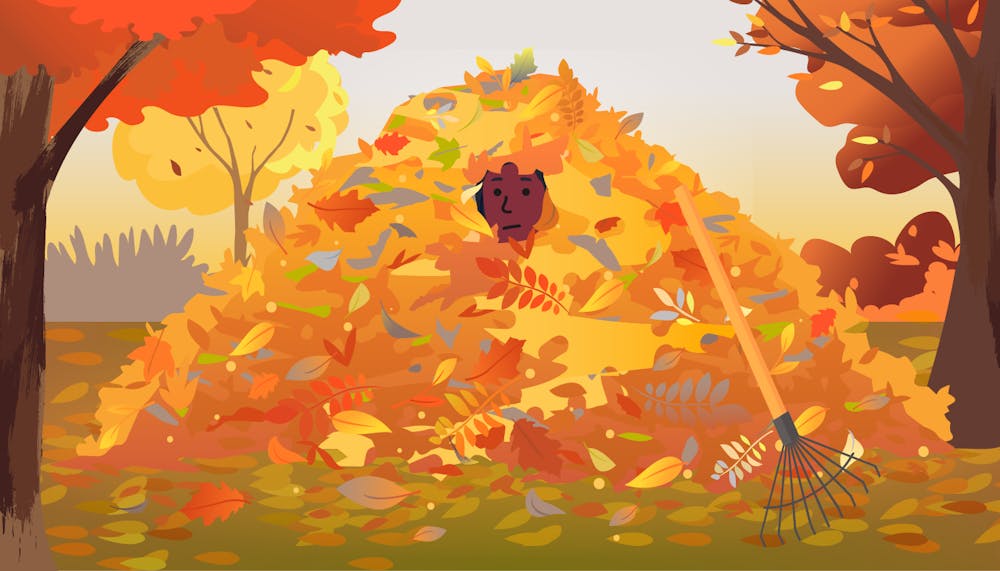One of my favorite things to do during the year is walk through the foliage. All the red and orange and yellow leaves are a welcome change after months of hot, humid weather and plain, green leaves. But the fall leaves save us; they encourage us to go out and enjoy being in nature with a different backdrop.
The sad thing is that the leaves don’t stay on the branches that long. Almost as soon as they start changing colors, they fall. Don't get me wrong, it’s a pretty sight. It's so aesthetic and peaceful to watch the leaves fall as you take a walk on campus or at a park. Yet with this act of nature comes the need to perform an annoying chore: raking leaves.
Raking leaves is fun for maybe 10 minutes. It quickly becomes one of the most tedious things to do in the world. You begin to collect leaves in one pile, and then you look around you and another 5,000 leaves have fallen across your lawn. It’s impossible to make any significant progress.
For decades in Bloomington, people would rake up leaves on the side of the road, and at the beginning of November, the city would send out trucks to vacuum up the piles. It was a simple and easy way to clean up the streets and get rid of the endless number of leaves.
But starting this year, the city has decided to end the leaf collection. Why? According to a city press release from this August, ceasing leaf vacuum collection will save approximately $400,000 annually. Funding from state taxes has been decreasing since 2019. The new plan will also supposedly reduce air emissions from diesel-fueled trucks that are used to collect the leaves. This supports the city’s Climate Action Plan, which aims to reduce greenhouse gas emissions by 25% by 2030 and achieve carbon neutrality by 2050.
Not vacuuming the leaves is asking for things to go wrong. First of all, most of the 13,500 households that are affected by this new measure may not want to rake up the endless number of leaves on their own, as well as collect them into paper bags for the city to collect. Most likely, people will either leave them alone and let their yards and street get messy and slippery, or hire another company to collect the leaves for them.
And this might not, in fact, eliminate air emissions. Some companies use electric-powered leaf blowers, but others may use gas-powered ones. This counteracts reducing greenhouse gas emissions because gas-powered tools are still actively being used to collect leaves. We have to admit that it’s a lot easier and more productive to use one.
Whether people hire companies or collect leaves themselves, the alternatives also have a detrimental impact on the environment. Studies show leaf blowers emit nearly 300 times more air pollutants than pickup trucks do. Some leaf blowers and mowers have a two-stroke engine, which burns oil and fuel into the air. This releases carbon monoxide, nitrous oxides and hydrocarbons into the air, which are extremely harmful to the environment. Those looking to collect leaves may not keep in mind these consequences or even be aware of them.
The city does propose other methods to collect leaves: you can mulch and compost them. I'm not sure this is something people will want to do. It's messy, and people naturally want to get rid of their leaves, not leave them there. And many may not want to spend the time or have any time in general to learn about how to mulch and compost or potentially spend the money to do so.
One efficient way to mulch leaves on your own is to mow the leaves with a lawn mower. While this is more efficient, you’d probably have to mow somewhat often to get rid of all the leaves. Using a lawn mower releases gas into the environment, which does not align with the city’s goal to reduce greenhouse gas emissions. It actually increases the amount of gas sent out into the environment compared to city leaf collection if a lot of people turn to this option as a solution.
If mulching doesn’t work, you may even need to spend money on fertilizer. There are also specific things to keep in mind when mulching: if leaves pile up too thickly, light and air won’t be able to reach the soil. It takes more time to mulch ash and maple leaves; this would require you to spend more time mowing, which releases more gas into the environment. You also need to be careful not to mow pine needles because they decompose too slowly and are bad for your lawn. It's hard to keep all of these things in mind when we all lead busy lives or even be mindful of them if mulching gets the job done anyway.
Now, while I understand the need to save money, the city wastes its money on meaningless things like building a monolith. In fact, city officials paused construction for the monolith due to backlash from the public. People were upset by the city’s lack of communication with the project, not to mention the nearly $1 million it would cost to build it. $1 million! On a monolith! Even though city officials are reconsidering the monolith’s design, it’s still a needless waste of money that could be used on other things. Why not reallocate the money originally put aside for a project people don’t like to help collect leaves instead?
Ultimately, ceasing leaf collection is a mistake. It's concerning that the city doesn’t see the drawbacks of leaving us on our own to deal with leaves. Their plan to reduce greenhouse gas emissions may turn out to be counterintuitive, and “saving” $400,000 a year to instead spend money on silly things like a monolith demonstrates the city’s lack of productivity and ability to serve the citizens’ real needs. Fall won’t be as enjoyable if we have to worry about raking up all our leaves.
Isabella Vesperini (she/her) is a sophomore majoring in journalism and minoring in Italian.






